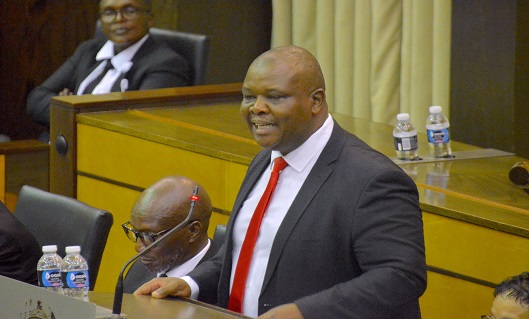
Thembisa Sholongu
The Department of Infrastructure Development (DID) has attained its fourth consecutive unqualified audit outcome with no material misstatements, according to the Auditor-General of South Africa (AGSA).
MEC Jacob Mamabolo expressed satisfaction with the department’s notable achievements while presenting its 2024 annual report to the Legislative on Thursday.
“This presentation affirms our unwavering commitment to enhancing our technical and administrative capacity to maintain a highly efficient, effective, and development-oriented public service.
“We aim to actively collaborate with empowered, fair, and inclusive citizens. We are confident that our department has the potential to emerge as a leader in infrastructure delivery, ensuring that all invoices are paid promptly, within the prescribed time, and with a steadfast focus on quality and cost-effectiveness,” said MEC Mamabolo.
DID has been allocated R3.773 billion for the current financial year, of which R3.756 billion has been thoughtfully spent.
The budget allocation for the current year increased by 11% compared to the previous financial year, largely due to the settlement of court orders and cost-of-living adjustments provided by the Provincial Treasury.
“Despite spending” 99.55% of the allocated budget, the department underspent by R16.9 million, a marked improvement compared to the R112 million underspent in the previous financial year.
“Of the R16.9 m” million underspent, R6.2 million related to alternative energy, R5 million to maintenance and repairs, R1.4 million to legal services, and R4.1 million to security services,” he said.
Mamabolo emphasized the importance of using technology to improve transparency and accountability, enabling client departments and all our critical stakeholders to conduct effective oversight of their work.
DID further intends to ensure the Project Readiness Matrix becomes an official policy for infrastructure delivery to play a critical role in identifying potential issues before they occur and reducing unforeseen project costs and delays.
“The Governance Lab will focus on project enforcement and provide the necessary oversight for successfully implementing project outcomes, including the Project Readiness Matrix (PRM), a critical governance tool that clarifies roles, fosters accountability, and fosters communication among all stakeholders.
“The purposeful “integration of smart technology solutions into the construction project management delivery ecosystem will enhance compliance to the Project Readiness Matrix,” the MEC said.”
In addition, the department received an additional R329 million for the Gauteng Energy Response Plan.
The investment in the GPG Solar PV and Battery Energy Storage System (BESS) programme has already rolled out solar systems at 28 health facilities, including ten hospitals across Gauteng, such as Thelle Mogoerane Regional, Jubilee, South Rand, and Kopanong hospitals.
“Over 12,400 solar panels have been installed under this programme, and thirteen Small, Medium, and Micro Enterprises (SMMEs) were appointed, creating 237 direct job opportunities, 187 indirect jobs, and 50 work opportunities for Expanded Public Works Programme (EPWP) participants.
This large-scale rollout of Solar PV and Battery Storage technology will provide a sustainable energy mix, drastically reducing the impact of loadshedding on Gauteng Provincial Government health facilities.”
The department has launched two programmes within EPWP aimed at reducing unemployment through the EPWP Health Maintenance Programme, which is implemented across three Metropolitans and two District Municipalities within Gauteng.
This initiative is expected to benefit 1,230 participants across five province corridors. For 12 months, they will be engaged in garden maintenance and the cleaning of administration blocks.
SOURCED FROM THE GPG WEBSITE.

